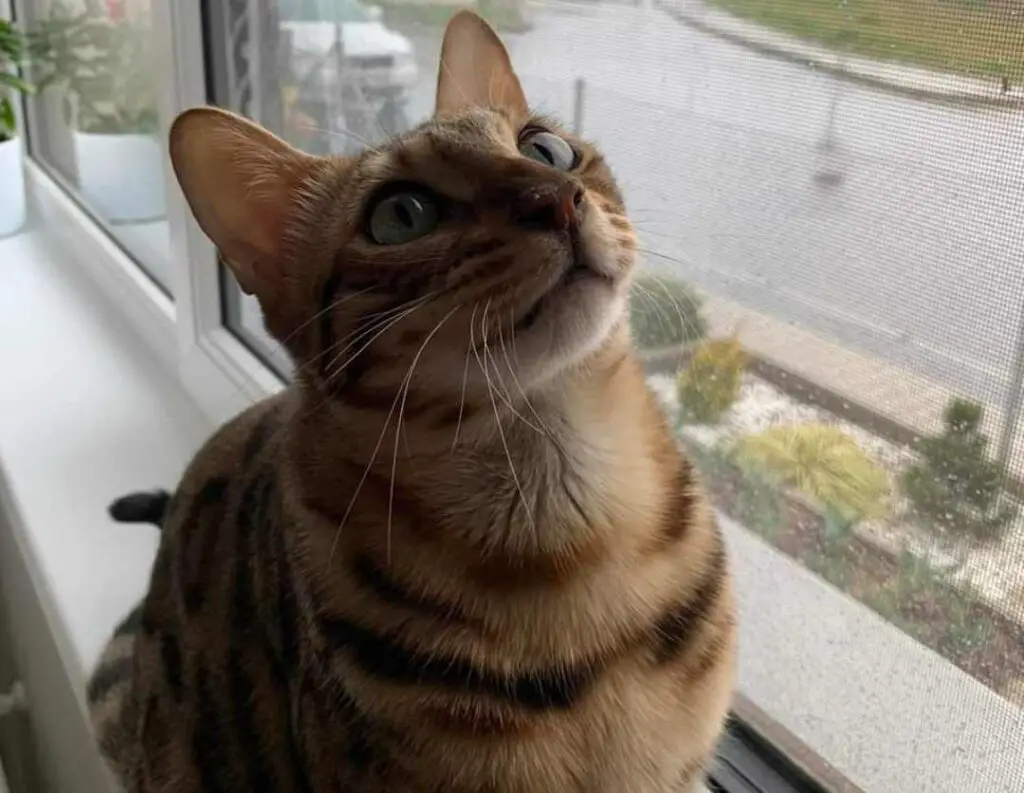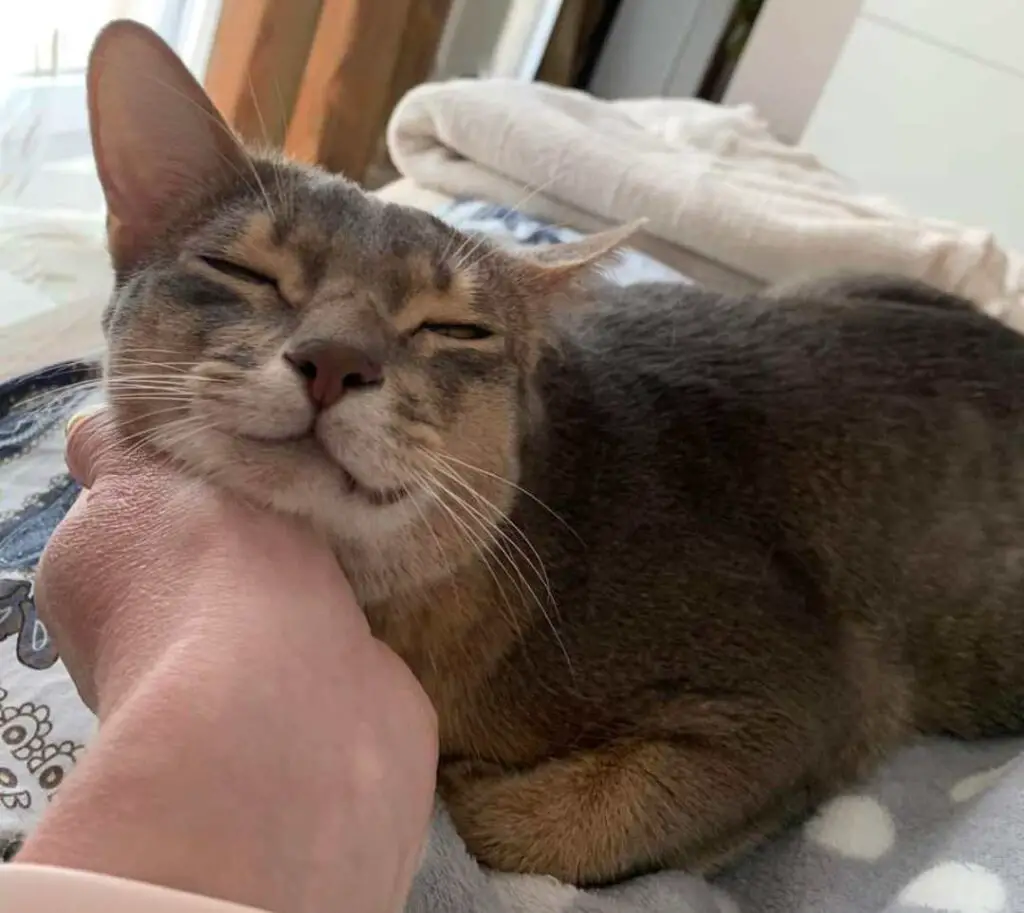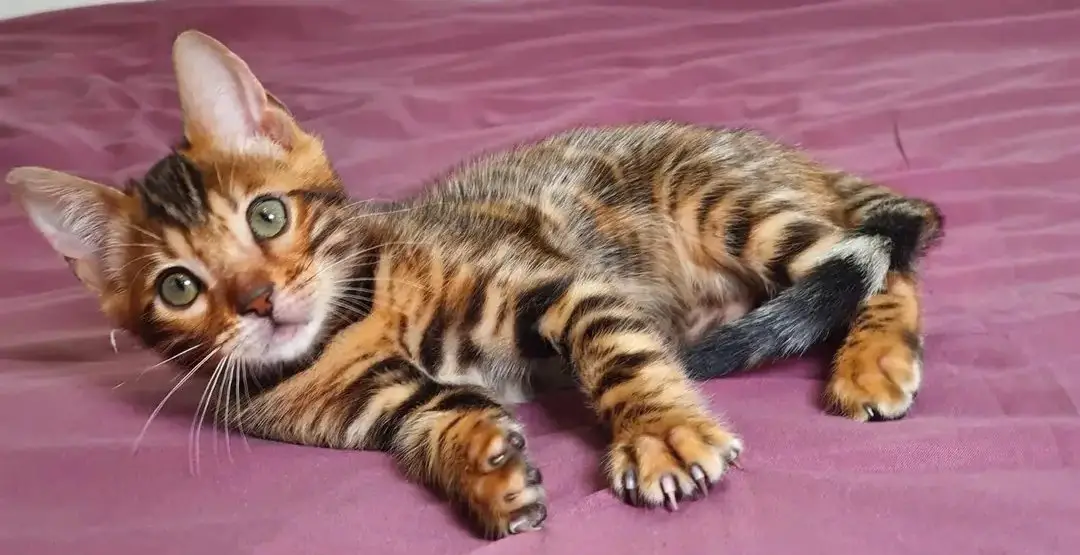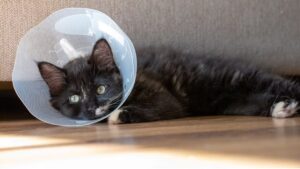Ever found yourself wide awake in the dead of night, listening to the haunting chorus of your cat’s persistent whines? Don’t worry, you’re not alone.
In this captivating article, I’ll explore the mysterious reasons why your feline friend turns into a vocal virtuoso after dark.
From loneliness to attention-seeking antics, I’ll dive into the depths of their nocturnal world and help you restore peace to your slumber-filled nights.
Let’s get started…
Reasons Your Cat Is whining at night
Your cat may be whining at night as a learned behavior of getting your attention, due to hunger, thirst, loneliness, discomfort, boredom, pain, not having access to the bathroom area, or a need for stimulation.
It’s important to rule out any underlying health concerns by consulting with your vet if you have tried all the solutions in this post.
Let me break it down further as a long time cat owner…

In my opinion, here are some of the most common reasons your cat is whining at night:
1. Your Cat is Hungry
From my experience living with cats, I can tell you that hunger is usually one of the most common reasons why cats whine at night if it’s a one-off thing.
Let me give you an example; if you return late from work, or you forgot to feed your cat due to other reasons, do you think your cat will allow you to sleep?
Keep in mind that you can only assume is hunger if it’s a one-off thing, but if the whining continues after feeding them, it’s definitely not hunger.
What can you do to avoid such situations?
To prevent your cat from whining at night due to hunger, there’s only one way, which is to create and stick to a feeding schedule that suits you and your cat.
This could be feeding your cat a couple of hours before bedtime on a daily basis and not skipping it for any reason.
2. Boredom or Loneliness
This is another reason why your cat might be whining at night, because if my cat Oscar is bored at night, trust me he will start unnecessary whining to get my attention.
In short, lack of mental and physical stimulation during the day can leave your cat restless and bored at night, prompting them to vocalize out of frustration.
What can you do to avoid such situations?
In my opinion as a cat owner, there are a few things you can do to avoid your cat whining at night due to boredom or loneliness.
This includes;
- Getting them interactive and engaging toys.
- Tiring them out before bedtime
- Playing with them to keep them busy for a while.
- Playing with them until they are exhausted and sleep off.
3. Attention-seeking Behavior
My cat Oscar is good at whining unnecessarily when you are not giving him the needed attention, especially at night.
So I can tell you that one of the common reasons your cat is whining at night may be attention seeking behavior.
This is not easy to deal with because if you give in and give them the needed attention it will be a routine for them, and each time they need your attention they start whining.
To address such a situation, you really need to create and stick to a daily routine and make sure you are not buying the idea of responding when they whine.
Instead, I suggest you redirect their attention to any engaging toy and reward them if they stop whining as this will reinforce positive behavior.
4. Not Having Access to Litter Box Area
Access to the litter box area is necessary for cats, and I can tell you if your cat doesn’t get access tho their litter box when they need it, this can lead to whining, be it day or night.
Your cat may not have access to their litter box for some reason, which includes;
- The road to the litter box was blocked with other objects.
- The litter box room is locked.
- Litter box area is too dark
- They have outgrown the litter box.
To address this, make sure you set up your cat litter box in a clear path, and probably keep the litter box in a place that is not always locked.
In short, make sure your cat has access to their litter box, irrespective of the time.
5. Learned Behavior
A learned behavior is also another common reason your cat is whining at night, and this might be due to negative reinforcement in the past.
If your cat starts whining at night, and you do nothing about it, rather you unknowingly reward them.
In simple terms, for the cat, it’s a good idea to whine at night so as to get attention.
If this goes on without you correcting it, it becomes a learned behavior over time, and addressing such issues usually takes time and effort.
To address such situation, you need to take a step back wards and start retraining your cat, stop rewarding them when they whine.
You can use desensitization and counter conditioning to stop your cat from such learned behavior.
6. Medical Issues
Just like us humans, cats can experience various health problems that might cause them to vocalize during the night or even during the day.
It’s essential to rule out any underlying medical conditions before assuming it’s solely behavioral. It’s possible your cat pain or discomfort is due to medical conditions.
Some potential culprits can include urinary tract infections, arthritis, hyperthyroidism, or dental pain.
If your cat’s nighttime whining is accompanied by other signs of distress, such as changes in appetite, litter box habits, or weight loss, it’s crucial to consult with a veterinarian promptly.
They will perform a thorough examination and recommend appropriate treatment options to alleviate your furry companion’s discomfort.
7. Stress or Anxiety

Cats are sensitive creatures, and stress or anxiety can manifest in various ways, including nighttime whining.
Common cat stressors may include changes in routine, new additions to the household (such as a new pet or family member), or even rearranging furniture.
Cats are creatures of habit, and disruptions to their familiar environment can trigger anxiety.
To address this, create a calm and consistent atmosphere for your cat. Provide them with a designated safe space where they can retreat and feel secure.
Additionally, consider using pheromone diffusers or calming aids specifically designed for cats to help reduce their anxiety levels.
If the problem persists, consulting with a veterinarian or a feline behaviorist can provide valuable insights and guidance.
8. Environmental Factors
Environmental elements that arouse your cat’s want to vocalize can also be the cause of nocturnal whining.
For example, your cat may become vocal when exposed to outside noises such as sirens, wildlife, or even other cats in the neighborhood.
If feasible, attempt to limit these external distractions by locking windows, using soundproof drapes, or establishing a peaceful sleeping environment for your cat.
Furthermore, giving your cat plenty of mental and physical stimulation during the day will help exhaust them and encourage a better night’s sleep.
9. Disorientation
Cats are renowned for their acute senses and easy navigation of their environment.
But as they become older, they can suffer from cognitive loss or disorientation, which could cause them to become restless and whiny at night.
This may be especially valid for older cats. To help them see better in the dark and navigate their surroundings, think about giving them nightlights.
A sense of security and a reduction in their bewilderment can also be given by establishing a regular schedule and keeping familiar landmarks.
Let’s talk about general solutions…
Effective Ways to Stop Your Cat Whining at Night

From my experience living with cats, here are some of the most effective ways to stop your cat from whining at night:
1. Establish a Consistent Routine: Cats thrive on routines, and establishing a consistent schedule can help reduce their nighttime whining. Ensure your cat has regular feeding and playtime sessions before bedtime, followed by some quality cuddling. This will help them associate bedtime with relaxation, making them less likely to whine for attention during the night.
2. Provide Mental and Physical Stimulation: A bored cat is more likely to whine for attention. Engage your furry friend in stimulating activities during the day, such as interactive toys, puzzle feeders, or play sessions. This will tire them out mentally and physically, making them more likely to sleep through the night.
3. Create a Comfortable Sleeping Environment: Make sure your cat has a cozy and comfortable sleeping area. Provide a soft bed or blanket in a quiet corner of your home, away from noise and distractions. Cats are naturally nocturnal, so creating an environment conducive to sleep can help minimize their need for attention during the night.
4. Avoid Reinforcing the Whining: While it may be tempting to respond to your cat’s whining, doing so can reinforce the behavior. Instead, ignore the whining and only provide attention when your cat is calm and quiet. This teaches them that whining does not lead to getting what they want, encouraging them to seek alternative means of communication.
5. Use Positive Reinforcement: Reward your cat’s desirable behavior with treats, praise, or additional playtime. This positive reinforcement helps them associate quiet behavior with positive outcomes, reinforcing the idea that silence is more rewarding than whining.
6. Consider a Nightlight: Some cats may feel anxious or insecure in the dark, leading to increased whining. Placing a nightlight near their sleeping area can provide a sense of security and minimize their need for attention during the night.
7. Reduce Environmental Triggers: Identify any potential triggers that may be causing your cat to whine at night. Common triggers include loud noises, other pets, or changes in routine. Take steps to minimize these triggers, such as closing windows to reduce outside noise or providing separate sleeping areas for multiple pets.
8. Consider a Companion: Some cats may benefit from having a feline companion to keep them company during the night. Introducing a compatible playmate can alleviate loneliness and reduce the need for attention-seeking behavior.
9. Consult with a Veterinarian: If your cat’s nighttime whining persists despite your best efforts, it may be a sign of an underlying health issue. Schedule a visit with your veterinarian to rule out any medical conditions that could be causing the behavior.
By implementing these effective strategies, you can stop your cat from whining at night and restore peace to your home.
Consequences of Ignoring Your Cat Whining at Night
There are a number of negative effects to ignoring or not addressing your cat’s nighttime whining.
First of all, it may cause you and your family members to experience sleep deprivation, which may have an adverse effect on your physical and emotional health.
Second, it could lead to commotions in your community and strained neighborly ties.
Thirdly, persistent whining might point to a medical problem that requires attention; delaying it could make the situation worse.
Finally, it may reinforce the behavior, which will make future attempts to confront and resolve it more challenging.
Conclusion
Ultimately, the secret to bringing peace back to your evenings is realizing why your cat likes to sing to you at night. You can lessen your feline friend’s nighttime grumbling and establish a peaceful environment for both of you by attending to their emotional and physical requirements, establishing a regular schedule, and offering engaging activities. So, say goodbye to restless nights and set out to have a pleasant night’s sleep with your best friend, your pet companion.
Related Questions
Why is my cat whining at night?
Cats may whine at night for various reasons, including hunger, discomfort, attention-seeking, or anxiety. It’s important to rule out any medical issues and ensure they have a comfortable sleeping environment. Consulting with a veterinarian can help identify the underlying cause and provide appropriate solutions.
How can I stop my cat from whining at night?
To address your cat’s nighttime whining, try establishing a consistent routine, providing mental and physical stimulation during the day, and ensuring they have a comfortable sleeping area. Avoid reinforcing the behavior by not giving in to their demands. If the behavior persists, consulting with a veterinarian or a professional animal behaviorist can provide further guidance.
Is it normal for cats to whine at night?
While some cats may vocalize at night occasionally, excessive or persistent whining may indicate an underlying issue. Cats are crepuscular animals, meaning they are most active during dawn and dusk. However, if your cat’s nighttime whining is disruptive or out of the ordinary, it’s advisable to consult with a veterinarian to rule out any medical or behavioral concerns.
Can anxiety cause cats to whine at night?
Yes, anxiety can be a potential cause of nighttime whining in cats. Cats may experience anxiety due to various factors, such as changes in their environment, separation anxiety, or fear. Creating a calm and secure environment, providing enrichment activities, and considering anxiety-reducing measures, such as pheromone diffusers or behavioral therapy, can help alleviate their anxiety and reduce nighttime whining. Consulting with a veterinarian or a professional animal behaviorist is recommended for a comprehensive assessment and tailored solutions.









